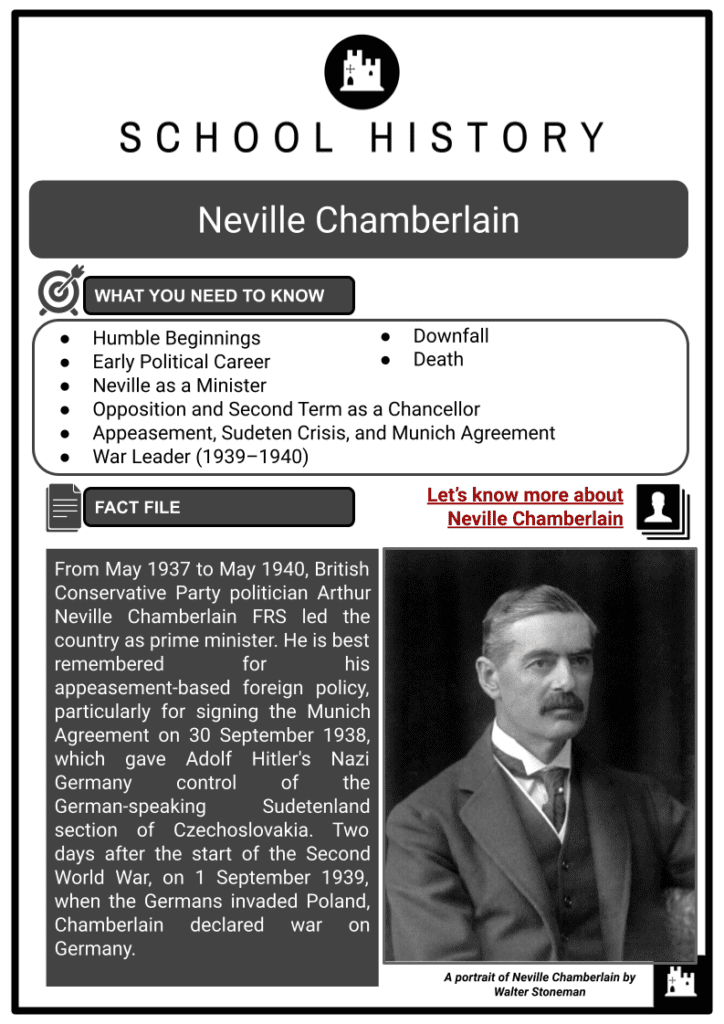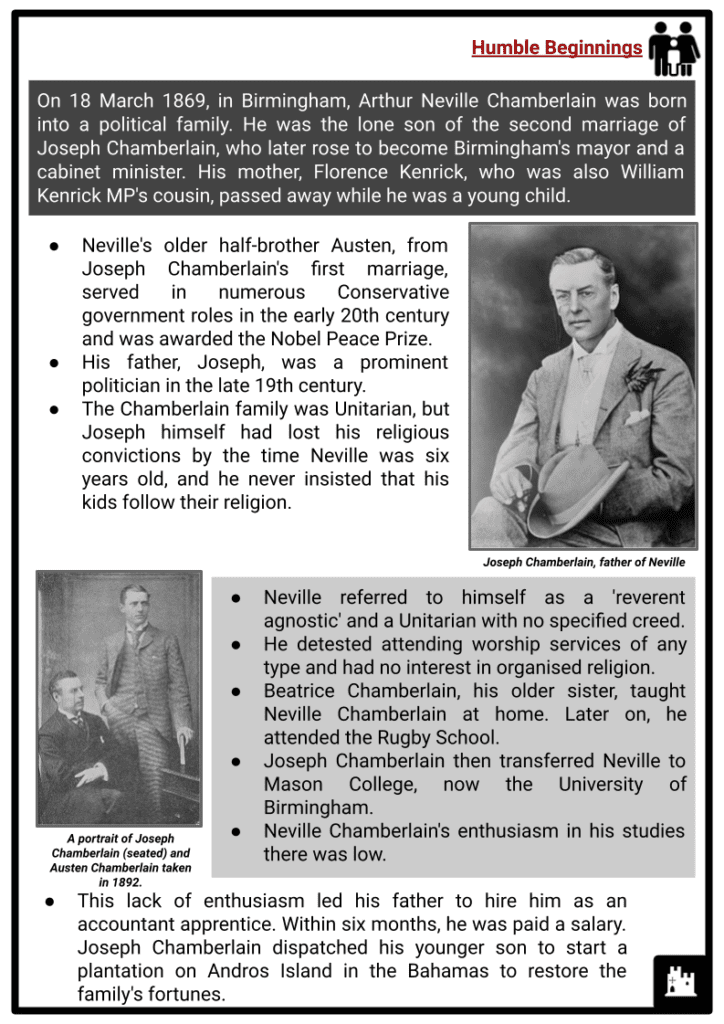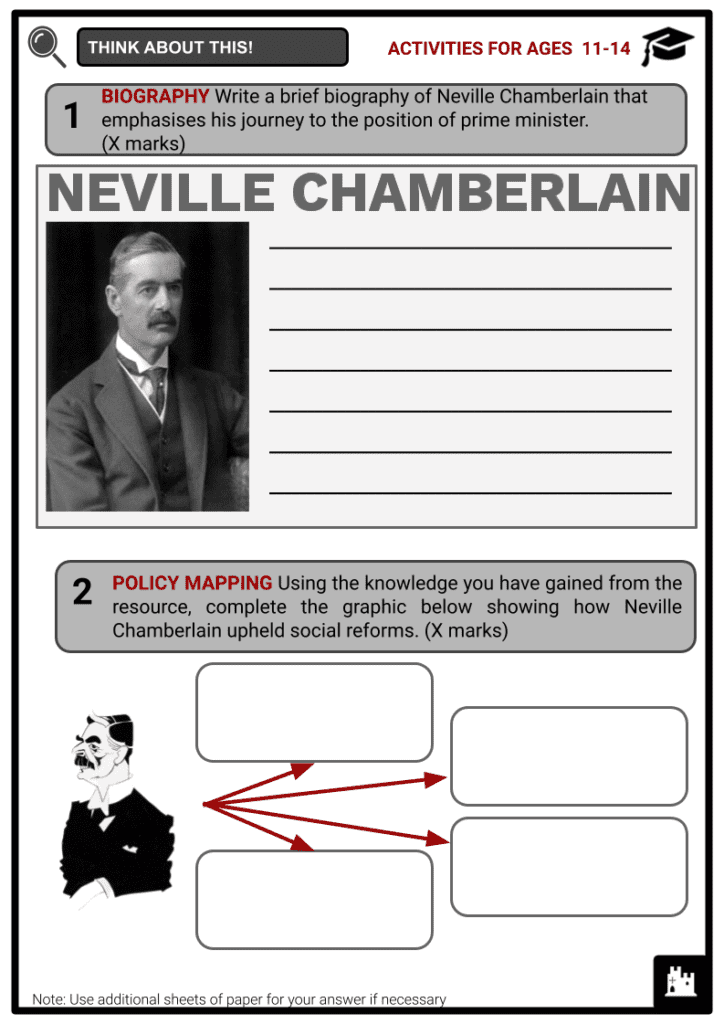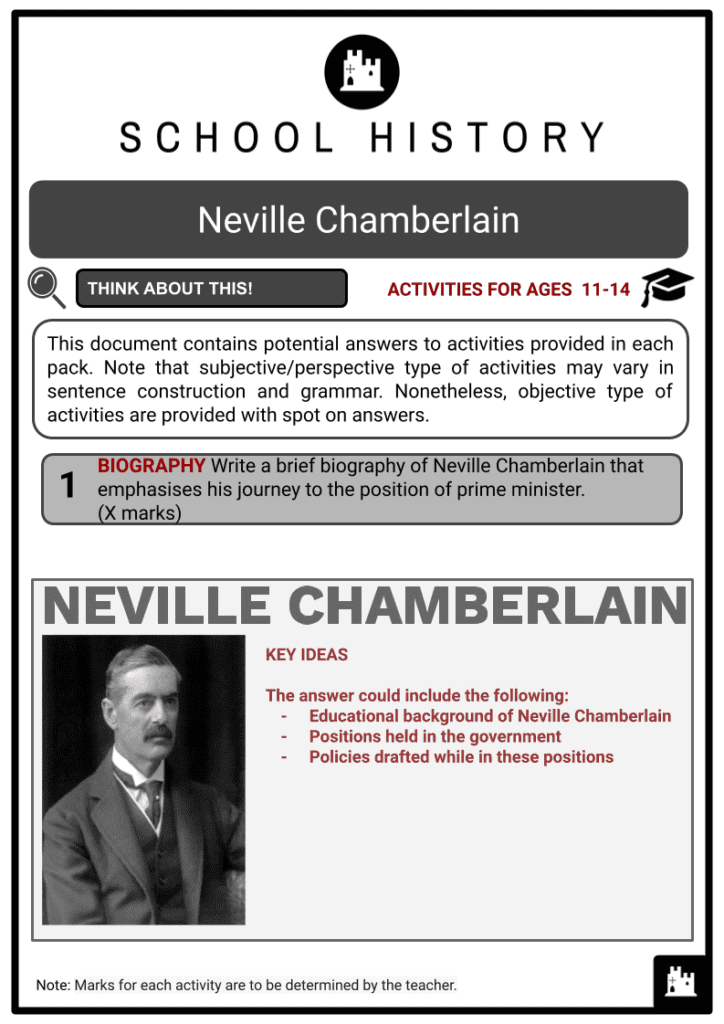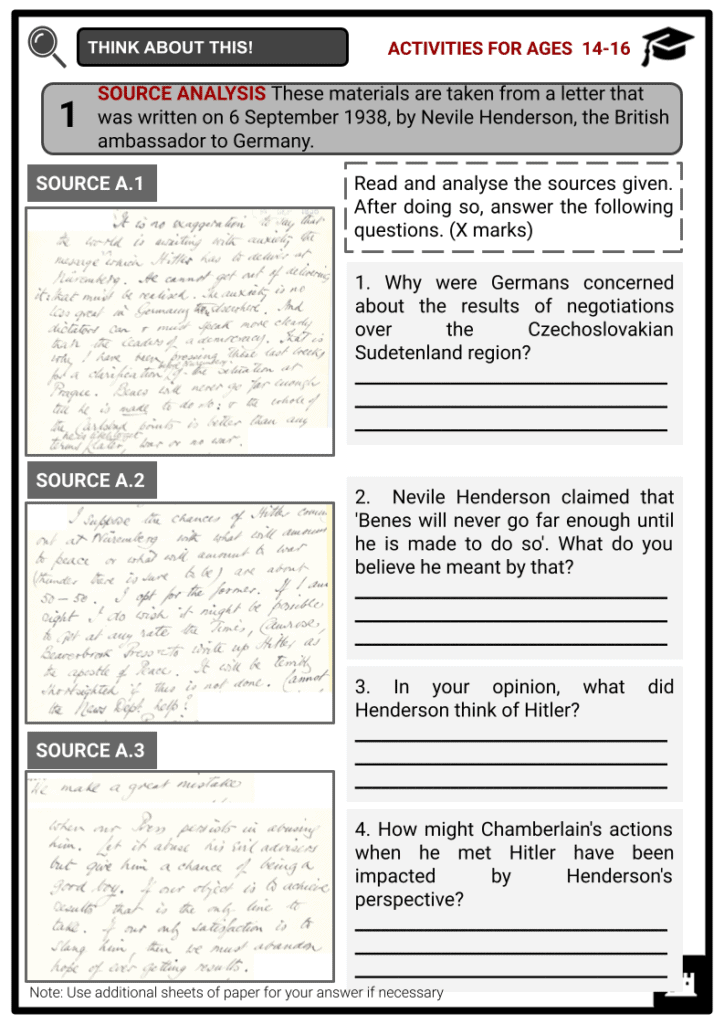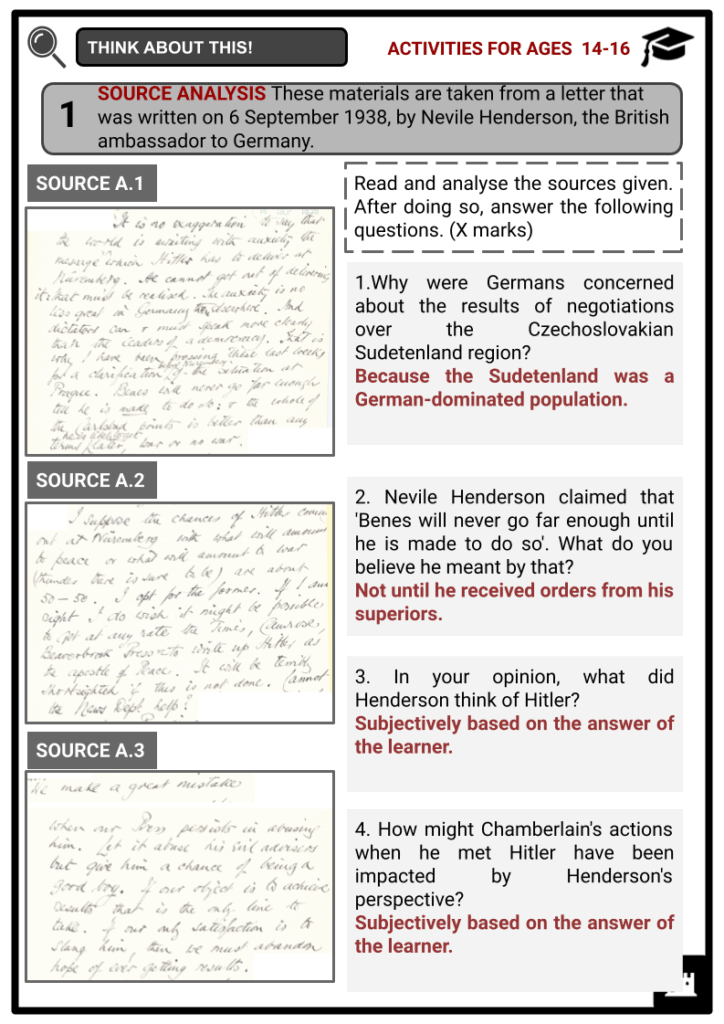Neville Chamberlain Worksheets
Do you want to save dozens of hours in time? Get your evenings and weekends back? Be able to teach about Neville Chamberlain to your students?
Our worksheet bundle includes a fact file and printable worksheets and student activities. Perfect for both the classroom and homeschooling!
Summary
- Humble Beginnings
- Early Political Career
- Neville as a Minister
- Opposition and Second Term as a Chancellor
- Appeasement, Sudeten Crisis, and Munich Agreement
- War Leader (1939–1940)
- Downfall
- Death
Key Facts And Information
Let’s find out more about Neville Chamberlain!
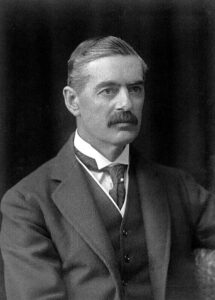
From May 1937 to May 1940, British Conservative Party politician Arthur Neville Chamberlain FRS led the country as prime minister. He is best remembered for his appeasement-based foreign policy, particularly for signing the Munich Agreement on 30 September 1938, which gave Adolf Hitler's Nazi Germany control of the German-speaking Sudetenland section of Czechoslovakia. Two days after the start of the Second World War, on 1 September 1939, when the Germans invaded Poland, Chamberlain declared war on Germany.
Humble Beginnings
- On 18 March 1869, in Birmingham, Arthur Neville Chamberlain was born into a political family. He was the lone son of the second marriage of Joseph Chamberlain, who later rose to become Birmingham's mayor and a cabinet minister. His mother, Florence Kenrick, who was also William Kenrick MP's cousin, passed away while he was a young child.
- Neville's older half-brother Austen, from Joseph Chamberlain's first marriage, served in numerous Conservative government roles in the early 20th century and was awarded the Nobel Peace Prize.
- His father, Joseph, was a prominent politician in the late 19th century.
- The Chamberlain family was Unitarian, but Joseph himself had lost his religious convictions by the time Neville was six years old, and he never insisted that his kids follow their religion.
- Neville referred to himself as a 'reverent agnostic' and a Unitarian with no specified creed.
- He detested attending worship services of any type and had no interest in organised religion.
- Beatrice Chamberlain, his older sister, taught Neville Chamberlain at home. Later on, he attended the Rugby School.
- Joseph Chamberlain then transferred Neville to Mason College, now the University of Birmingham.
- Neville Chamberlain's enthusiasm in his studies there was low.
- This lack of enthusiasm led his father to hire him as an accountant apprentice. Within six months, he was paid a salary. Joseph Chamberlain dispatched his younger son to start a plantation on Andros Island in the Bahamas to restore the family's fortunes.
- Even though Neville Chamberlain lived there for six years, the plantation failed, and Joseph Chamberlain lost £50,000.
- Neville Chamberlain started a business upon his return to England by purchasing Hoskins & Company, a producer of metal ship berths, with help from his family.
- During Chamberlain's 17 years as managing director of Hoskins, the business prospered.
- He was active in Birmingham's civic life as well. As the Governor of Birmingham General Hospital, Chamberlain joined no more than fifteen other luminaries in creating the British Medical Association's National United Hospitals Committee in 1906.
- In the United Kingdom, doctors are represented by the British Medical Association (BMA), a recognised trade union. The General Medical Council, not the BMA, is in charge of overseeing doctor certification and regulation.
- At the age of 40, Chamberlain planned to remain single. However, in 1910, he fell in love with Anne Cole, a recent married acquaintance, and they wed the following year.
- They first connected through his aunt Lilian, a Canadian-born widow of Joseph's brother Herbert, who had then married Alfred Clayton Cole, a director of the Bank of England, in 1907. Alfred Clayton Cole was the uncle of Anne Cole.
- After Neville was elected as an MP, Anne shared his interests in housing and other political and social activities and served as his constant companion, aide and valued colleague. She also encouraged and supported his entry into local politics. The couple had a daughter and a son.
Early Political Career
Neville as a Birmingham Politician
- Although Chamberlain had continued to deliver speeches in general elections, his decision to enter politics in 1911 at the age of 42 was motivated by his interest in local politics and the chances for social advancement they provided. Chamberlain testified in favour of a bill that would have combined Birmingham and its suburbs before a parliamentary committee.
- The city's size and population more than tripled after the measure was approved. Chamberlain had a keen interest in Birmingham's urban planning. During this period he was able to accomplish tasks that pushed for good urban planning.

- Over 100,000 dwelling units lacked bathroom facilities, and nearly half of those didn't even have running water, according to Chamberlain.
- He encouraged gradual restructuring to address the issue and warned that the local government needed to be prepared to seize assets if the private sector faltered.
- Under Chamberlain's leadership, Birmingham swiftly adopted one of Britain's earliest town plans, which would later be imitated by other significant industrial cities like Liverpool and Leeds. But the outbreak of war in 1914 made it impossible to carry out his ambitions in Birmingham.
- When World War I began in August 1914, Chamberlain got heavily involved in the fight. In addition to serving as a counsellor, Chamberlain established funds for wounded soldiers and assisted with the recruitment of soldiers for the Royal Warwickshire Regiment.
- He was elected as a Birmingham alderman at the end of 1914, and he was elected Lord Mayor the following year. Since Joseph Chamberlain had passed away the year before, according to Neville Chamberlain's biographer Robert Self, the honour was earned by his efforts rather than through family connections.
- Chamberlain had a mountain of work to accomplish as the Lord Mayor during the war, and he insisted that his council members and officials work just as hard.
- When coal became scarce, he built up stockpiles to give to the poor at no cost. He revived Birmingham's different committees, many of which were inefficient and involved in the wasteful competition.
- He also served as the local committee's chairman and claimed to be more lenient than the other tribunal members in examining conscription exemptions.
- The Lord Mayor's travel reimbursement was slashed in half, and the incumbent was expected to do fewer civic duties. Chamberlain formed the Birmingham Municipal Bank to promote saving to pay back the war loan.
- When coal became scarce, he built up stockpiles to give to the poor at no cost. He revived Birmingham's different committees, many of which were inefficient and involved in the wasteful competition.
- He also served as the local committee's chairman and claimed to be more lenient than the other tribunal members in examining conscription exemptions.
- The Lord Mayor's travel reimbursement was slashed in half, and the incumbent was expected to do fewer civic duties. Chamberlain formed the Birmingham Municipal Bank to promote saving to pay back the war loan.
- The bank was quite profitable and operated until Lloyds Bank acquired it in 1976. In 1916, Chamberlain was re-elected Lord Mayor, but he did not serve his full term.
Director of National Service
- Conscription had been implemented during the first half of 1916, but not for the civilian industrial sector.
- A Manpower Distribution Board had been established by Neville's brother Austen during the conclusion of Asquith's administration in 1916, but it lacked executive authority.
- Following Edwin Montagu's rejection of the newly created Director of National Service position (because he believed the task of establishing a new ministry was beyond his capabilities), Chamberlain, who was already well known on a national level, was suggested for the position by his brother Austen.
- David Lloyd George, the new prime minister, made the job offer to him in December 1916. In this capacity, he would be in charge of organising conscription and making sure that crucial war industries could operate with enough workforce.
- Chamberlain resigned as Lord Mayor of Birmingham despite his reluctance to do so. Lloyd George left a lot of questions about Chamberlain's actual responsibility unanswered.
- When Lloyd George announced Chamberlain's appointment, he hinted in the House of Commons that 'compulsion', the industrial equivalent of conscription, would be extended to industry and that Chamberlain would soon produce a system of industrial enrollment.
- However, Chamberlain discovered that the prime minister's political manoeuvres and need to appease the trade unions hindered his ability to do his job. Lloyd George promised that he would reject any form of 'industrial conscription', while Chamberlain attempted to increase the number of workers forced into both military conscription and industry.
- Despite Chamberlain's persistent requests, Lloyd George and his War Cabinet rejected his suggestions for mandatory duty.
- At this point, the Army still had control over its recruitment, and Chamberlain ran into opposition from the Labour and Munitions Ministries.
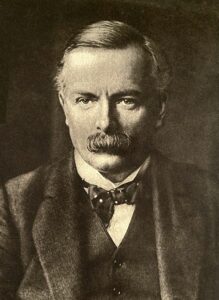
David Lloyd George, British prime minister 1916–1922. - Chamberlain wasn't appointed to the Privy Council. Aside from James Stevenson from the Ministry of Munitions, who served briefly as Deputy for Civil Recruiting, he disregarded Lloyd George's advice regarding his choice of advisers and instead chose buddies from Birmingham who were equally incompetent as he was.
- In June 1917, Chamberlain came very close to resigning after learning that he had been granted a new Parliamentary Secretary without being informed or consulted.
Candidate and Backbencher
- After resigning from his position as director, Chamberlain travelled back to Birmingham, resentful of his time spent in London.
- He continued to serve on the City Council and kept busy with his family, business and civic responsibilities.
- He was named Deputy Mayor in February 1918 after declining to serve a third term as Lord Mayor. The future prime minister's cousin, Norman Chamberlain, who had previously served on the City Council and shared his social views, and Chamberlain had developed a close connection.
- The discovery of Norman Chamberlain's body in February 1918, after he had been declared missing in action during the Battle of Cambrai in December 1917, shocked Neville Chamberlain, who had referred to Norman as 'the closest friend he had'.
- Some historians link Norman's death to his cousin's appeasement-related loathing of war.
- For the remainder of his career, Neville Chamberlain worked tirelessly to advance his cousin's beliefs and authored his biography, the only book he ever finished.
- However, according to Chamberlain's biographer Nick Smart, the tragedy did not make Chamberlain dislike World War I, and any influence on his later attitudes is far from definite.
- After some doubt about his future career, Chamberlain decided to run for office in the British Parliament, despite his concern that his parliamentary career would be limited and unfulfilling given his National Service experience.
- He first had significant trouble locating a Birmingham constituency despite his desire to run for office. Birmingham received additional seats due to the Representation of the People Act of 1918, and Chamberlain was chosen as the candidate for Birmingham Ladywood, one of the new seats.
- As Lloyd George gave the Liberals in the coalition more than their proportionate number of offices, Unionist backbenchers had been uneasy for a while.
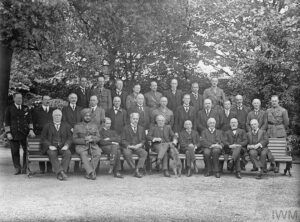
Imperial War Cabinet, 1918 (taken in the Gardens of 10 Downing Street) - Unionist resentment at the Lloyd George coalition government erupted in October 1922.
- The Unionist MPs refused to follow orders when they were called to a meeting at the Carlton Club to discuss the next election, which, like the one in 1918, was to be fought in alliance with the Lloyd George Liberals.
- Instead, they voted to contest the election as a single party. Premier Lloyd George announced his resignation.
- Austen Chamberlain and most Unionist leaders had backed the coalition and pushed for its continuation.
- According to Austen Chamberlain's resignation letter from their positions in the government and party, the Labour and Liberal parties were not supportive of his policies.
- Bonar Law was invited to serve as the Unionists' prime minister from retirement. Neville Chamberlain did not have to decide whether to back his brother's leadership or overthrow a prime minister he detested since he was in Canada at the time of the meeting.
Neville as a Minister
- In the first two weeks after being appointed Minister of Health, Chamberlain gave the Cabinet a list of 25 bills he wanted to see passed. Twenty-one of the twenty-five had become laws before he left office in 1929. A very early and well-liked piece of legislation, the Widows', Orphans' and Old Age Contributory Pensions Act of 1925, was approved after Winston Churchill, the Chancellor of the Exchequer, agreed to obtain the required financing.
- The act also provided for the dependents of workers who had passed away and lowered the eligibility age for receiving the government's old age pension from 70 to 65. The selected Poor Law Boards of Guardians, which dispensed aid and in some regions were in charge of establishing rates, were abolished by Chamberlain (local property taxes).
- Many of the boards were under the influence of Labour and disobeyed the government by giving aid to the employable unemployed.
- Following the general strike, unemployment rates were high in many mining villages, and several Poor Law boards used provisions meant for unusual situations to help unemployed employees.
- These boards applied the requirements to almost all applications, providing benefits.
- As a result of the system's crisis, Chamberlain worked to obtain additional legislation that would have allowed the Minister of Health to remove obstinate boards and subjected their members to criminal penalties.
- Despite no charges being brought against any board members, Chamberlain disbanded three councils and appointed new members in their place. Finally, Chamberlain introduced legislation in 1929 to eliminate the Poor Law boards and replace them with organisations chosen by local authorities.
Opposition and Second Term as Chancellor
- After Baldwin called for a general election on 30 May 1929, Labour won the most seats in the subsequent hung Parliament. Following the resignation of Baldwin and his administration, Labour, led by MacDonald, retook power. In 1931, the May Report revealed that the budget was out of balance, with a predicted loss of £120 million. This put the MacDonald government in a dire situation. On 24 August, the Labour administration resigned, and MacDonald established a national government with the support of the majority of Conservative MPs.
- Chamberlain visited the Ministry of Health once more. Following the resounding victory of the national government's (primarily Conservative) candidates in the 1931 general election, MacDonald appointed Chamberlain as Chancellor of the Exchequer.
- Chamberlain suggested a 10% tariff for foreign commodities, whereas the colonies' and the Dominions' products would have lower or no duties.
- Neville Chamberlain presented his bill to the House of Commons on 4 February 1932 and noted that it was proper for him to attempt to enact the plan, Imperial Preference, that his father had proposed.
- In April 1932, Chamberlain unveiled his first budget. He upheld the drastic spending cuts agreed upon at the start of the national government.
- Chamberlain cut the portion of the budget allocated to interest on the war debt in half between 1932 and 1938.
War Debt
- Chamberlain anticipated that an agreement might be reached to negotiate eliminating the war debt owed to the US. The World Monetary and Economic Conference, which Britain held in June 1933, was unsuccessful because US President Franklin D Roosevelt issued a message stating that he would not entertain any reduction of war debt.
Welfare Spending
- Chamberlain was significantly responsible for founding the Unemployed Assistance Board (UAB, established by the Unemployment Act of 1934), and he wanted to see the debate over unemployment benefits become non-partisan.
Defense Spending
- In Chamberlain's initial budgets, defence funding had been drastically reduced. He was persuaded of the necessity of rearmament by 1935 when he confronted a resurgent Germany led by Hitler. Chamberlain specifically advocated for bolstering the Royal Air Force because he understood that air power could not be resisted by Britain's traditional bastion, the English Channel. Baldwin took over as prime minister for the third time in 1935 after MacDonald resigned.
Role in the Abdication Crisis
- The 1936 abdication crisis is thought to have been significantly influenced by Chamberlain. In the note for that day in his diary, he called Wallis Simpson a 'dishonest lady who is not in love with the King but is manipulating him for her reasons'.
- He concurred with Baldwin that the King should resign if he married Simpson, as did the rest of the Cabinet, except Duff Cooper, and on 6 December, they both emphasised that the King should make his decision before Christmas.
Domestic Policies
- Chamberlain did not realise that his actions on foreign policy would be remembered; he considered his appointment to the position of premier as the pinnacle of a career as a domestic reformer.
- He hoped that by resolving European problems he would be able to focus on home matters, which was one of his motivations.
- The Factories Act 1937 was passed by Chamberlain shortly after he became premier. This act limited the hours that women and children could work and improved working conditions in factories. The Coal Act 1938, passed by Parliament in 1938, authorised the nationalisation of coal reserves.
- That year, the Holidays with Pay Act 1938 was another significant piece of legislation. The act encouraged employers to provide employees a week off with compensation. Still, it also significantly increased the availability of summer camps and other forms of leisure lodging for the working classes.
- The Housing Act of 1938 upheld rent control and offered subsidies to encourage slum removal.
- Because of the start of the war in 1939, Chamberlain's ideas for local government reform were abandoned. The elevation of the school age to 15 — which was supposed to take effect on 1 September 1939 — did not happen.
Appeasement, Sudeten Crisis, and Munich Agreement
- Chamberlain tried to make the Nazi regime a partner in a stable Europe by appeasing Germany. In March 1936, during the Rhineland Crisis, he had said that 'if we were in sight of an all-round settlement, the British government needed to address the matter' of restoring colonies. He believed that Germany might be pleased by the restitution of some of its colonies.
Appeasement
- For many people, Neville Chamberlain has come to symbolise the 'appeasement' strategy that many European nations used after World War I.
- These nations were determined to prevent another major conflict in Europe over disputed land that they did not deem to be of essential importance (such as had happened with Serbia in World War I).
- Additionally, France and Britain were unprepared psychologically, economically and militarily for another war in Europe because of horrific wartime losses.
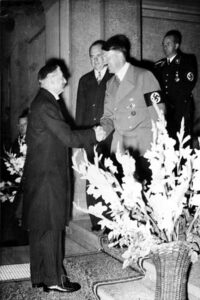
At the start of the Bad Godesberg summit on 24 September 1938, Adolf Hitler welcomes British Prime Minister Neville Chamberlain. Hitler then demanded the immediate annexation of Czech border regions. - Because of this, many European politicians decided to pacify belligerent leaders like Hitler.
- By making tiny, relatively painless concessions to meet Hitler's demands while giving him the chance to start a war, diplomats saw appeasement as a strategy to prevent conflict rather than as a kind of surrender.
- Furthermore, Europe was left without a solid international organisation that could take any action to stop or punish German aggression due to the failure of the League of Nations, which was established after World War I.
- In addition, there was reluctance to uphold the harsh conditions the Allies had placed on Germany. Thus, with minimal resistance from Europe, Hitler was able to retake the Rhineland despite the military restrictions imposed on him by the Versailles Treaty.
The Sudeten Crisis
- The Sudeten Crisis in 1938 posed the biggest threat to the appeasement strategy.
- Territorial expansion for the German state was one of Hitler's main objectives. He had every intention of achieving this goal through war.
- Hitler shifted his attention in 1938 to Czechoslovakia, a nation that the Versailles Treaty had just established under the principle of national self-determination.
- According to this concept, national and ethnic groups have the right to control their own political destinies.
- Since it was impossible to guarantee that all national boundaries denied all ethnic groups, many Germans unexpectedly found themselves in the Sudetenland region of Czechoslovakia.
- Nationalist Germans in the Sudetenland clamoured for a return to Germany, encouraged by the Nazis.
- Hitler used the provisions of the Versailles Treaty to his detriment. He and his allies in Czechoslovakia stated that Germans were oppressed and that '3,500,000 Germans were dragged away from their compatriots by a company of madmen [Versailles Treaty]'.
- Thus, Hitler asked that the Sudetenland be returned to Germany as per the principles of national self-determination.
- To 'defend' its citizens, he made it apparent to Europe that Germany was getting ready to attack Czechoslovakia.
The Munich Agreement
- On 15 September 1938, Prime Minister Neville Chamberlain flew to Berlin to 'achieve peace' since it appeared that war was imminent.
- Hitler resisted and consented to hold off on taking military action in exchange for Chamberlain discussing how to resolve the problem.
- Hitler's entourage and Italian dictator Benito Mussolini probably advised him to avoid starting a war.
- To establish a binding agreement, Chamberlain returned on 29 September with Mussolini and French Prime Minister Daladier.
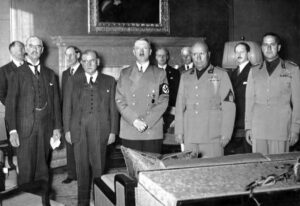
From left to right: Neville Chamberlain, Édouard Daladier, Adolf Hitler, and Benito Mussolini pictured before signing the Munich Agreement - They decided that Germany would receive the Sudeten region. The leaders of Czechoslovakia were not present and were not consulted, but it was made plain that they would not be supported if they rejected the terms.
- Hitler concurred, and when Chamberlain arrived in England, he told a crowd, 'Peace for our time,' believing he had prevented war.
Aftermath
- The Munich Agreement was seen favourably by many Europeans as having stopped a war and at least partially rescued Czechoslovakia.
- Ironically, Hitler was humiliated by the deal. He had intended conflict, but he was outwitted into a peaceful outcome. He vowed never to repeat that error.
- Hitler also ruined Neville Chamberlain's career and forever discredited the idea of appeasement strategy when he later broke his word not to demand any more territory and invaded Poland.
War leader (1939–1940)
Declaration of War
- Poland was attacked by Germany early on 1 September 1939. Late in the morning, the British Cabinet convened and warned Germany that until it left Polish territory, the UK would fulfill its responsibilities to Poland.
- No official declaration of war was made right away. Georges Bonnet, the foreign minister of France, declared that until the evening of 2 September, when its Parliament convened, France could take no action.
- Bonnet was attempting to mobilise support for an Italian-proposed conference in the mould of Munich that would take place on 5 September.
- Bonnet's pleadings from Paris persuaded Chamberlain and Halifax that France needed additional time for mobilisation and evacuation. The request's deadline was postponed by Chamberlain even though it had not yet been fulfilled.
Phoney War
- The Labour and Liberal parties were offered the chance to join Chamberlain's Cabinet but declined, so he established a War Cabinet. He reinstituted Churchill to the Cabinet as First Lord of the Admiralty, who also held a place in the War Cabinet.
- Eden also received a job from Chamberlain – Dominions Secretary, but not a spot in the constrained War Cabinet. The new First Lord was a challenging Cabinet member who constantly barraged the prime minister with long memos.
- As Churchill and Chamberlain met in the War Cabinet daily, Chamberlain chastised him for sending so many notes.
- Like most Allied leaders and generals, Chamberlain believed the war could be won relatively soon if economic pressure was maintained on Germany through a blockade while rearmament continued.
- The British economy was not something the prime minister wanted to change too much.
Downfall
- Early in 1940, the Allies approved a naval operation to invade neutral Norway's northern region, including the critical port of Narvik, and maybe also to take control of the Gällivare iron mines in the north of Sweden, which provided much of Germany's iron ore.
- The Allies intended to take a large portion of Norway after first mining the country's waterways to incite a German response there. Germany had planned to invade Norway as well, but the Allies were unaware of this, and on 9 April, German forces occupied Denmark and started an invasion of Norway.
- Later that day, Chamberlain met with Attlee after deciding that he would retire unless the Labour Party agreed to join his Cabinet. Attlee refused, but he consented to consult his National Executive, which was convening in Bournemouth at the time.
- Chamberlain preferred Halifax to be the next prime minister. Still, Halifax was unwilling to assert his position because he believed that his membership in the House of Lords would limit his influence in the House of Commons.
Death
- At the age of 71, Chamberlain passed away from intestinal cancer on 9 November 1940. A memorial ceremony was held at Westminster Abbey on Thursday 14 November, five days later. However, the day and hour weren't widely publicised because of security concerns during the conflict.
- John Colville, Chamberlain's former private secretary, served as the service's usher, and Winston Churchill and Lord Halifax carried the casket.
- His ashes were cremated and placed next to Bonar Law's in the Abbey.
Image Sources
- https://en.wikipedia.org/wiki/File:Neville_Chamberlain_by_Walter_Stoneman.jpg
- https://en.wikipedia.org/wiki/File:David_Lloyd_George_1915.jpg
- https://en.wikipedia.org/wiki/File:Imperial_War_Cabinet,_1918.jpg
- https://en.wikipedia.org/wiki/File:Bundesarchiv_Bild_146-1976-063-32,_Bad_Godesberg,_M%C3%BCnchener_Abkommen,_Vorbereitung.jpg
- https://en.wikipedia.org/wiki/File:Bundesarchiv_Bild_183-R69173,_M%C3%BCnchener_Abkommen,_Staatschefs.jpg

